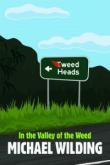 1758798810527071155.jpg
1758798810527071155.jpg
 1758798810527071155.jpg
1758798810527071155.jpg
'Suspended from his job when his politically incorrect email correspondence is leaked on the internet, Tim Vicars disappears. Is he hiding in shame?
'Is he running away from the erotic complexities of wife, mistress and literary agent?
'Or has his research project on decriminalizing marijuana provoked the growers, dealers and intelligence agencies to direct action?
'Plant, hired to find him, heads off into the Valley of the Weed.' (Publication summary)
'Michael Wilding's latest mystery novel, In the Valley of the Weed, is a strange, almost sinister book. It begins with disarming straightforwardness: an oddball PI named Plant is roused from his usual state of inertia to investigate the disappearance of a local professor whose politically incorrect email correspondence recently made national news. From the first, Wilding's knack for fluid dialogue and his confident, breezy style make the pages turn as quickly as any mystery fan could hope for. Before long, however, Wilding's conspicuous lack of interest in following the conventional rhythms of a satisfying whodunit cannot be ignored. Well before Weed's pointedly cryptic anticlimax, its persistent subversion of familiar tropes makes Wilding's true purpose clear: not to craft a good mystery but to deliberately deconstruct the form. And that's fine. To wed a given genre to postmodern theory is maybe not the freshest idea out there—few minds remain to be blown, one assumes, by the idea that a mystery's narrative dynamics change if its author does not include a concrete solution—but not every novelist can pull off an academic switcheroo quite this bold and still hold readers' interest until the end. For that success, if no other, Wilding is to be commended.' (Introduction)
'Michael Wilding's latest mystery novel, In the Valley of the Weed, is a strange, almost sinister book. It begins with disarming straightforwardness: an oddball PI named Plant is roused from his usual state of inertia to investigate the disappearance of a local professor whose politically incorrect email correspondence recently made national news. From the first, Wilding's knack for fluid dialogue and his confident, breezy style make the pages turn as quickly as any mystery fan could hope for. Before long, however, Wilding's conspicuous lack of interest in following the conventional rhythms of a satisfying whodunit cannot be ignored. Well before Weed's pointedly cryptic anticlimax, its persistent subversion of familiar tropes makes Wilding's true purpose clear: not to craft a good mystery but to deliberately deconstruct the form. And that's fine. To wed a given genre to postmodern theory is maybe not the freshest idea out there—few minds remain to be blown, one assumes, by the idea that a mystery's narrative dynamics change if its author does not include a concrete solution—but not every novelist can pull off an academic switcheroo quite this bold and still hold readers' interest until the end. For that success, if no other, Wilding is to be commended.' (Introduction)